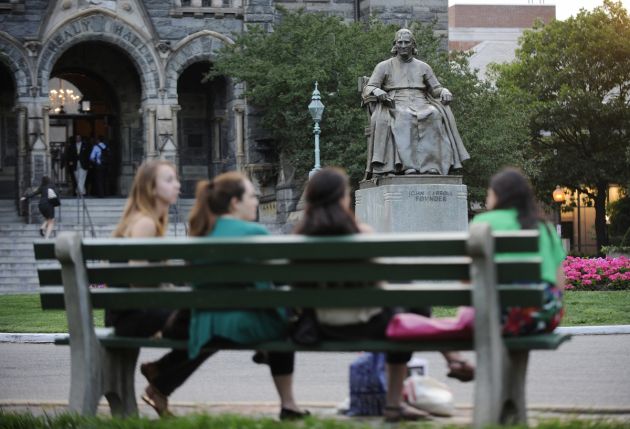Nuns get partial win in US Supreme Court contraception fight

WASHINGTON (Reuters) - The U.S. Supreme Court said on Friday that, while litigation continues, an order of Roman Catholic nuns need not comply with a part of President Barack Obama's healthcare law requiring employers to provide insurance that covers contraception.
In the latest skirmish over religious objections to providing government-mandated contraception, the four-sentence court order was a partial victory for the Little Sisters of the Poor, a Baltimore-based order of nuns that runs nursing homes, and Illinois-based Christian Brothers Services, which manages healthcare plans for Catholic groups.
The unusually worded order by the court imposed a requirement on the groups before they can claim the exemption. First, they must send written notification to the Department of Health and Human Services saying they object to the contraception mandate.
The court's decision means that, as long as the groups send the letters, they are effectively exempt while litigation continues in lower courts, putting off for now any conclusive decision on this latest legal test of Obamacare, as the president's 2010 Affordable Care Act has become known.
The Becket Fund for Religious Liberty, which represents the groups, hailed the court's order.
"We are delighted that the Supreme Court has issued this order protecting the Little Sisters," attorney Mark Rienzi said in a statement. "The government has lots of ways to deliver contraceptives to people. It doesn't need to force nuns to participate."
A spokeswoman for the U.S. Justice Department stressed in an email to Reuters that the order was not final. "This injunction applies only to the plaintiffs and is not a ruling on the merits of their case. And plaintiffs have always been eligible for an accommodation from the contraceptive coverage requirement."
'PAPERWORK, NOT RELIGIOUS LIBERTY'
Cecile Richards, president of Planned Parenthood Federation of America, which supports the mandate, said in a statement the case focused only on the way groups like the Little Sisters can claim an exemption. "This is a case about paperwork, not religious liberty," she said.
Dozens of other Catholic groups are involved in similar litigation, and most have won temporary injunctions. So far, no federal appeals court has ruled on the merits of the groups' claims, according to the Becket Fund.
The organizations have accused the federal government of forcing them to support contraception and sterilization in violation of their religious beliefs, or face steep fines.
The Little Sisters lawsuit was filed also on behalf of hundreds of other groups that obtain benefits via Christian Brothers Services, although that has not been certified as a class-action at this stage. The Becket Fund said it would also benefit from the court's order.
The unsigned Supreme Court order said it "should not be construed as an expression of the court's views on the merits."
OBAMACARE'S MANDATE
The Obamacare law requires employers to provide health insurance policies that cover preventive services for women, including contraception and sterilization.
The act makes an exception for religious institutions such as houses of worship that mainly serve and employ members of their own faith, but not for schools, hospitals and charitable organizations that employ people of all faiths.
As a compromise, the administration agreed to an accommodation for non-profits affiliated with religious entities that was finalized in July. But the Little Sisters and other Catholic groups said the compromise process still violated their religious rights.
In court filings, the government had conceded it could not enforce the mandate against the Little Sisters in any case because of the nature of their health-care plan.
A federal judge in Colorado, William Martinez, denied the plaintiffs' request for an injunction on Dec. 27. The Denver-based 10th U.S. Circuit Court of Appeals followed suit on Dec. 31, prompting a last-minute plea to the Supreme Court.
Although Justice Sonia Sotomayor issued a temporary injunction on Dec. 31, the court then spent more than three weeks weighing how to proceed.
In separate cases, the Supreme Court has agreed to hear oral arguments in March on whether for-profit corporations can object to the contraception mandate on religious grounds.
(Reporting by Lawrence Hurley; Editing by Kevin Drawbaugh, Gunna Dickson, Toni Reinhold)
